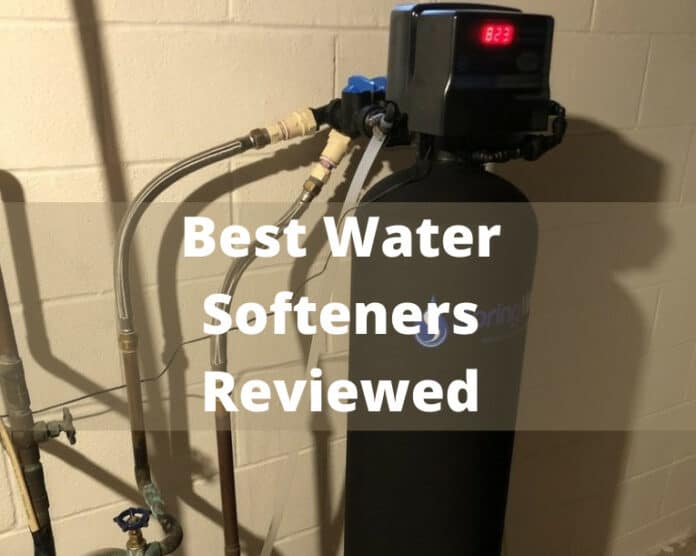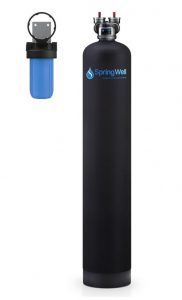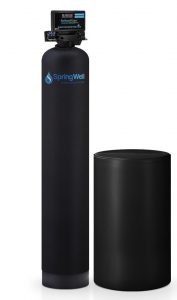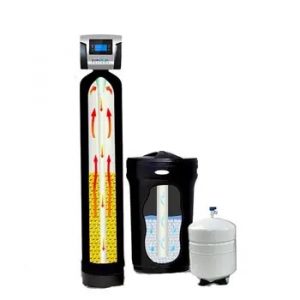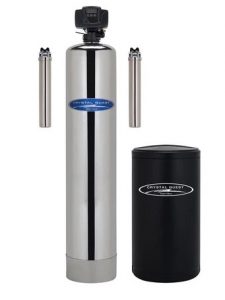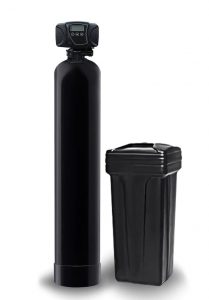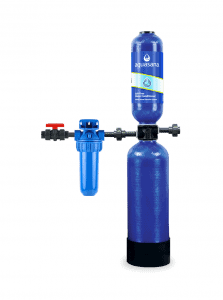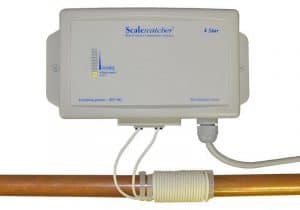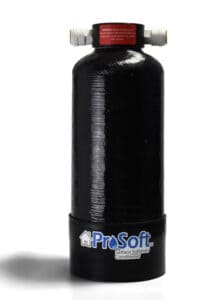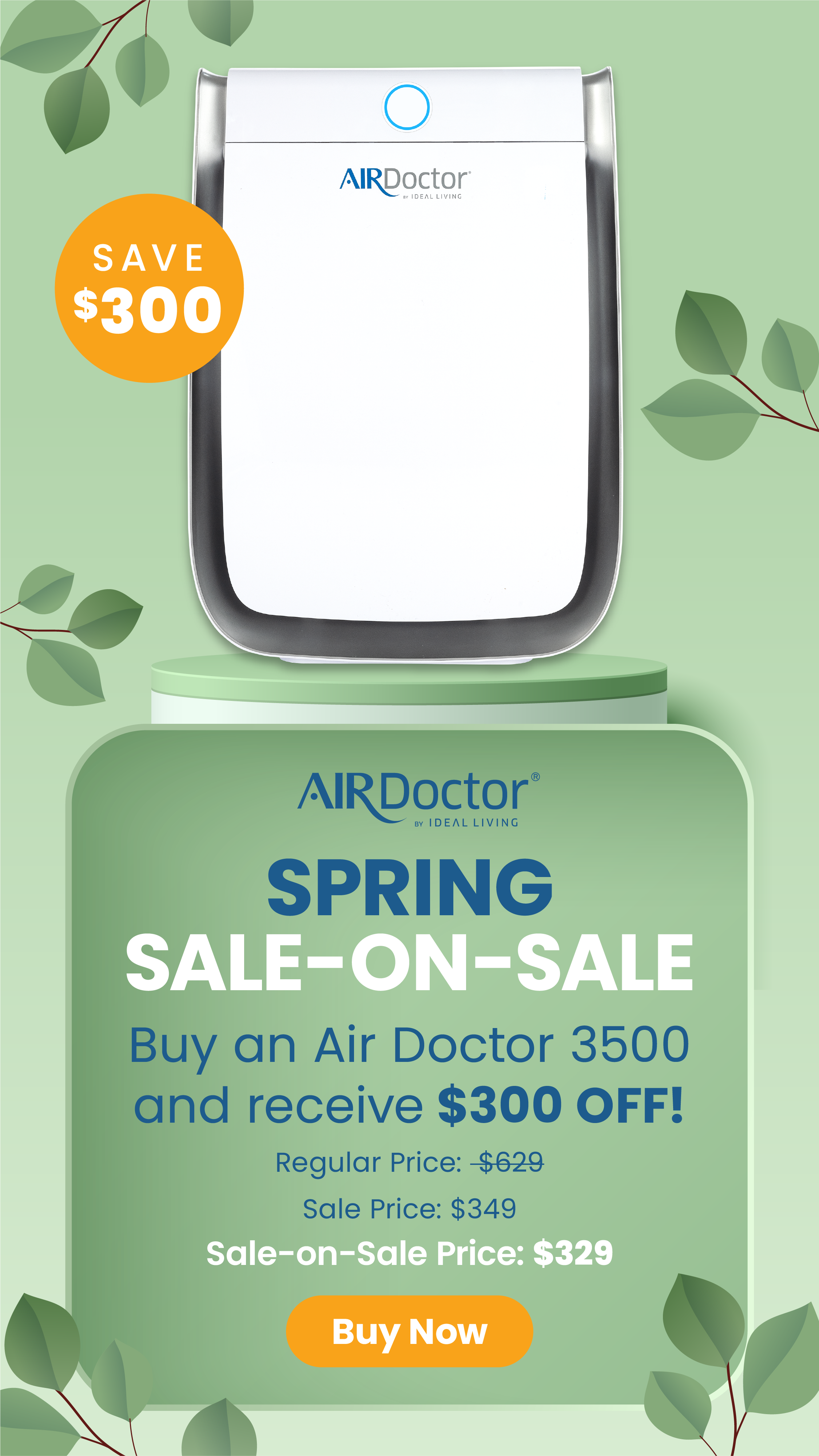Water has a unique chemistry. Any dissolved contaminants in the water can change its properties on many levels. When groundwater passes through different layers of the earth’s crust, it dissolves other elements from the earth. Minerals like Calcium and Magnesium, when dissolved in water, it makes the water hard.
Hard water cannot be consumed directly for drinking. It also causes scales in the water pipes and can damage electrical appliances like washing machines and dishwashers. It shortens the life of these appliances and increases the energy consumption of these appliances.
The hardness of water is directly proportional to the concentration of Calcium and Magnesium in water. To resolve this aspect, there are water softeners available on the market. The only purpose of these water softeners is to eliminate the presence of these minerals. However, some water softeners also remove other contaminants present in the water.
Table of Contents
Best Water Softeners
-
Best Overall: SpringWell Futuresoft Salt-free Water Softener
This water softener from SpringWell is the best choice from every aspect and thus tops our list of products. The Futuresoft Salt-free water softener is for your entire home. It prevents future scaling in the pipe and removes the existing scaling in the water pipes. This ensures the long life of all your appliances.
The water softener adjusts itself to the degree of water hardness and provides water that will not cause scaling. It is a salt-free softener, making maintenance zero. It also does not use electricity and wastes no water during the process.
Pros
- Cheap maintenance than other softeners in the market
- Does not waste electricity
- Does not waste water during the process
- Removes just the amount of minerals from water that causes scales but retains some of it for maintaining the nutrients in the water
- Simple to install
- Water pressure remains the same
Cons
- Some people prefer complete removal of Calcium and Magnesium, but this softener retains a minute quantity of it.
- Reduces scaling but does not exactly soften water
- The resin inside the tank will require a complete change after some time
This product is your top choice if your primary concern is scaling. This salt-free softener is more expensive than other models that do the same thing, but the quality makes it worth it. With no regular salt consumption, this softener should be your top choice if you want to install the softener and forget about it.
-
Best Salt-Based: SpringWell Salt Based Water Softener System
Another Softener from SpringWell makes it to our list. This is a traditional salt-based water softener system. It uses the ion exchange method in its high-quality filter that easily removes water hardness and eliminates the existing and future scaling in the pipes.
The softener is made using polypropylene wrapped in a neoprene sleeve that makes it durable and sturdy. This also ensures that the softener can survive any extreme climate.
Pros
- Best softener available that softens water efficiently
- It comes with a DIY installation kit
- The ion exchange resin regenerates itself when necessary, saving water and money.
- Different sizes available as per the bathrooms available
Cons
- Expensive considering the other options available in the market
- It does not work with higher water pressure (80 PSI and above)
If you prefer a salt-based ion-exchange softener, then this one from SpringWell is the best pick. It offers the most optimum performance by removing the hardness causing minerals completely. The result is not just soft water but no more scales on the appliances.
-
Best for Well Water: SoftPro Elite Water Softener
The SoftPro Elite Water Softener offers high efficiency like its contemporaries. There are 2 models available from the brand. One is specifically for city water and the other for well water. It also offers different grain capacities that start at 24,000 to offer optimum performance. This model also saves money and the cost of continuous salt consumption.
Pros
- Easy installation if you know the basics
- The design is compact
- Saves water
- Salt consumption is less frequent as compared to other softeners. Thus saving money
- The well water model can remove 3PPM iron from well water.
Cons
- The initial setup cost is high
- A bigger model will take a lot of space
Although this model is on the expensive side of water softeners, it does offer a little more than the others. Not all water softeners can remove iron from well water, which is where this one scores. In the longer run, it saves you a lot of money. They have an excellent customer care service that can easily help you solve your problems quickly.
-
Runner Up: Crystal Quest Whole House Water Softener with Pre/Post Filtration
What is better than one product with double benefits? That is what this product from Crystal Quest offers. The Whole House Water Softener can be combined with a pre/post-filtration system to consume pure and soft water. If your water supply brings you not just hard but contaminated water, it can be a major task to get safe water for drinking.
The water softener is based on the ion exchange process that efficiently removes the calcium and magnesium ions. Thus it can easily prevent scaling and provide soft water. The Crystal Quest water filtration system has a 3 stage process to remove dirt, sand, VOCs, pesticides, insecticides, ad other industrial solvents.
Pros
- An affordable choice for softening and filtration
- The effective traditional method of water softening is used
- Potassium chloride can be used as a healthier option than sodium
Cons
- Salt consumption is high
- Requires more space
The Crystal Quest model is available in 2 different casings: stainless steel and fiberglass. It also offers different resin variants depending on your requirement. Pick this product if you are looking for a complete one-time solution for your water supply.
-
Best Budget Salt-Based: Fleck 5600SXT 48K Grains Water Softener
The digital softener from Fleck is what an average person can afford easily and relax for the rest of their lives. This whole house water softener comes with high resin that regenerates itself depending on the water usage. It also saves water in the long run and provides exceptional performance.
Fleck takes absolute pride and confidence in their product, so they send a test kit that can analyze the softness of water.
Pros
- The quality of softened material is appreciated by 99% of its customers
- Smart meter to monitor the water consumption
- Large enough for the whole house
- It comes with a lifetime warranty
- Resin is pre-installed, making the setup self-installable
Cons
- Regeneration can wastewater
- Not compact enough
- Maintenance and salt top-ups can be frequent in a year
The Fleck 5600SXT 48K Grains Water Softener is certified by the Water Quality Association in the US. Along with the lifetime warranty on the resin tank, the company offers free and fast shipping within the US.
-
Best Budget Salt-Free: Aquasana Salt-Free Water Conditioner
A water conditioner is a product that changes the chemistry of water to make it soft. It does not use salt or other harsh chemicals, nor does it completely strip the water of the essential nutrients.
If you are looking for an eco-friendly and environmentally friendly way to reduce the limescale in your house, then this is the best option. Water conditioners, in general, cannot treat tough water. Instead, it can work with just a moderate range of hardness. Thus Aquasana’s Salt-Free Water conditioner can give you soft water that can be used for cleaning and laundering but not for drinking. But if paired with a filtration system, it can provide you with drinking water.
Pros
- Reduces limescale to 99.6% from the pipes
- Minerals remain intact in water
- No drop in water pressure
- It comes with a basic filtration process with a sediment pre-filter
Cons
- Does not treat extremely hard water above 25 GPG
- Expensive and has additional installation charges are a must
- Is not certified
- Maintenance and changing parts are not easy
While the system is good for the environment, it does little to solve the problem of drinking hard water. However, if drinking water isn’t your concern, this can be a great way to prevent water and salt wastage mandatory in other water softeners.
-
Best Electronic: Scalewatcher 4 Star Electronic Water Softener
The patented Scalewatcher water softener is the most trusted and dependable product available in the market. Many businesses, homes, water parks, and factories use this water softener worldwide.
The Scalewatcher 4 Star Electronic softener is the powerful top unit for home by Scalewatcher. This non-commercial unit helps remove the existing scales and prevent the build-up in the future.
Pros
- A powerful softener that keeps the beneficial minerals intact
- Does not waste salt
- Low maintenance
- Easy installation
Cons
- It can descale water, not softens it
- Customer service isn’t as expected
No matter what the company’s online reputation is, it does what it says. It watches your scale and reduces it to an extent where you do not have to bother about it again. You can see visibly reduced scaling within the first couple of days. However, the water from this product isn’t softened for drinking.
-
ProSoft Saltless Water Softener/Conditioner
ProOne is a brand that has had a lot of success with its water filter system. Its revolutionary water softener/conditioner is designed to fit its filter system to soften water. It is a salt-less system designed to stand apart from the traditional water softeners, which use salt or chemical to soften water.
Priced at an affordable price, this is also environment friendly. It can quickly neutralize calcium and magnesium by neutralizing them as micro-crystals. This lets the minerals easily pass through the pipes without causing scaling in the pipes.
Pros
- Environment friendly
- No monthly maintenance
- Easily works for 100,000 gallons a year
- Easily refillable tank with easy filling
Cons
- Can work treat water with a hardness level of 11 grains
- Cheaper options are available in the market
Water Softeners Buying Guide
With so many water softeners available today, you need to determine the best one for your requirement. Every water softener has a specific capacity in grains per gallon or GPG. A small system for a kitchen starts at a capacity of 24,000 GPG, while a bigger one can cost 64,000 GPG.
The size of the water softener highly influences your choices. Choosing a water softener as per your requirement is crucial because of 2 basic reasons. A bigger water softener tank that isn’t used frequently would become a ground for bacteria growth inside the resin tank. This would increase the maintenance and replacement costs. A smaller water softener system used frequently would work rigorously to meet your needs. That would mean a continuous and generous supply of salt even before the schedule for regeneration.
To pick the best water softener for your requirement, you only need to know two things. First, find out the hardness of water and water consumption every day. When these numbers are multiplied, you get the daily requirement for water softening. To get the value for a week, multiply this by 7, and you can easily pick a water softener based on this number. This is the grains per gallon capacity that you have to pick.
What Is A Water Softener?
A water softener is a special system that fits the plumbing system or comes as an attachment to the waterline. It aims to remove the hardness from water and reduce scaling caused by hard water. Hard water tends to cause a lot of scaling and damage to appliances or faucets. Too much exposure to hard water can cause dryness to the skin and hair. Hard water is not recommended for cooking and laundering also. It may cause damage to clothes, food, and utensils too.
Water softener helps eliminate this hardness from water by treating water with one of the softening technologies. A water softener can also help remove other contaminants in water and balance the water’s pH value.
Do I Need Water Softener?
Before buying a water softener, you need to be sure that it is essential for your home. A basic water hardness test will reveal if this is needed or not. To determine the hardness, you have to check the GPG of water. GPG stands for grains of hardness per gallon/ grains per gallon. It indicates the concentration of magnesium and calcium in the water.
Test kits are easily available in the market that can indicate the water hardness level. Alternatively, if you see scales on your faucets, laundry, or dishes, it is a sign of hard water.
Some other contaminants can also cause an imbalance in water chemistry. Be sure that you have an issue with hard water and not just any other kind of contamination. To be 100% sure, check with a water testing lab near you.
Once you have determined the cause, you can opt for a water softener if the water is hard or any other kind of filtration system, depending on the contamination.
What is Hard Water?
Water that has a high quantity of minerals present in it is termed hard water. This is because water gets deposited in the earth’s crust, exposed to calcareous, chalk, or gypsum deposits. When water is in contact with these deposits for a long duration, many calcium or magnesium carbonate, bicarbonate compounds, and sulfates dissolve in water. This forms hard water.
While a little quantity of calcium and magnesium can be consumed daily, large quantities can change the taste of water. It will also lead to the formation of scales on electrical appliances that regularly come in contact with hard water.
Signs And Problems of Having Hard Water
If you have shifted to a new place or suddenly feel a strange change in water, look for these signs to figure out if you are exposed to hard water.
– If the taste and smell of water have changed. A metallic taste or smell of rotten eggs can indicate the presence of hardness causing metals in water
– Unusual stains on sinks, toilet pots, vessels indicate hard water. Water scales can form on faucets, showerheads indicating excessive calcium. These scales are very hard to clean. Calcium deposits stay back on the faucets after the water has evaporated.
– Hard water does not let soap form foam. If you face this issue, you are likely in contact with hard water
– It also leaves soapy residue during a bath on the skin. This happens because hard water does not let soap wash off the body.
– Hard water deposits can also clog the showerhead. So if you are noticing a drop in the water pressure during showers, hard water is the cause.
Clogging water pipes and faucets is also a common problem you face with hard water.
– If you notice your washed laundry is not clean enough, it is likely that hard water isn’t cleaning out all the detergent from your laundry. This leftover detergent in the clothes is inviting more dirt on the clothes.
– Skin irritations are another likely issue caused by hard water. Eczema is a prevalent issue with hard water.
– Hard water can also cause your electrical appliances to wear off quickly.
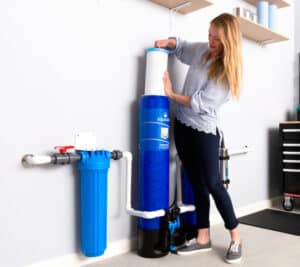
Types of Water Softeners
-
-
Salt-Based Water Softeners
- Pros:
- They are the traditional water softening system that is the most effective.
- A simple exchange of hardness-causing ions, i.e., magnesium and calcium, are replaced with sodium ions from salt.
- It has a regeneration process to flush the hard minerals automatically within a set period
- Cons:
- It wastes a lot of water
- Increases the water salinity
- Not eco-friendly and environment friendly
- Pros:
-
Dual Tank Water Softeners
- Pros:
- It uses two tanks to treat hard water, continuously producing soft water.
- No downtime even during regeneration
- Suitable for commercial business and homes as well
- Cons:
- Expensive than single-tank systems. These cost almost twice the single tank systems.
- Pros:
-
Salt-Free Water Softeners
- Pros:
- It does not strip the essential minerals completely from water
- Can easily remove the limescale formation issue
- It uses an efficient crystallization method to prevent hardness-causing minerals from sticking to the surfaces.
- The most eco-friendly option available does not include wastewater.
- Cons:
- It does not remove the hardness of water
- It cannot work with water having a high GPG value
- Expensive for tackling just the limescale issue.
- Pros:
-
Electronic Water Descalers
- Pros:
- Uses electromagnetic waves to change the composition of minerals in hard water
- Effective in preventing the formation of scales
- Uses magnets or coils of wire instead of salt and water. This means less cost and less wastage of water.
- Low maintenance
- Cheap
- Cons:
- They do not soften water. It only helps in descaling.
- There are claims that this technology is not as effective
- Pros:
-
Things To Consider When Buying Water Softener for Home
- Technology Type of Water Softener
There are 3 kinds of technologies currently in the market for water softening.
– Descalers – These electronic devices are attached to the plumbing line of the water supply. It uses electromagnetic waves that prevent scaling. If you only need to get rid of the scales, this is the option. Hard minerals in water are not removed from this system.
– Conditioners – Most water conditioners use crystallization technology to eliminate hard minerals like calcium and magnesium from water. This doesn’t let them form scales in the pipes.
– Ion-exchange – This is a traditional form of softening hard water. It uses sodium from salt to exchange the calcium and magnesium ions in hard water. Ion exchange technology easily turns hard water into soft water and prevents scaling.
- Cost
The budget has a great influence when considering buying a water softener. A smaller budget means that the search is limited to a few options. It also means that you can specifically look into the systems available along with their monthly maintenance cost. It is ideal to understand and collect the 3 basic expenses with the water softener.
– Initial cost of the softener
– Installation charges
– Maintenance cost in the long run, which included replacing internal parts as well as cost for salts
Water softeners that don’t work using salt are the most affordable. You can use conditioners or descalers to improve the water quality. These units would cost you below $1000 and do not have long-term costs involved too.
The salt-based ion-exchange softeners are expensive and cost around $1300. They will also need a salt top up every month and wastewater during the regeneration process.
Most water softener systems need professional installation as they need to be fixed in the waterline. Electronic descalers are an exception. So if you do not have experience, this will come as an added charge of around $200.
- Flow Rate
Water softening is a time-consuming process. It takes a specific time for the system to produce soft water ready for use. The amount of water in gallons per minute that the system can generate soft water is known as its flow rate. This also depends on the type of technology being used for softening water. For example, Resin-based technology needs the water to be in touch with resin for a long. This will also depend on the number of faucets being used simultaneously, the size of the house, and other factors. The hardness of water is another factor that needs to be accounted for. A larger resin will ensure that the flow rate is high. Many water softeners do not affect the flow rate.
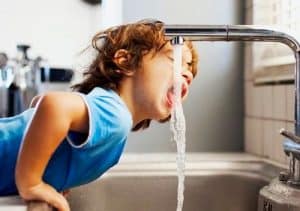
Water Softener Regeneration Methods
The kind of regeneration methods used by a water softener depends on their technology. Descalers do not regenerate themselves as they use magnets or coils to condition the hard water.
Ion-exchange filters use resin beads to soften water. After a specific time, these resin beads regenerate themselves by flushing out the toxins and unwanted minerals. They waste a good amount of water which costs a lot on your water bill.
There are single-tank water softeners that can use time-based or demand-initiated regeneration methods. Demand-initiated or metered regeneration gets triggered when as per the water usage. A digital meter on the tank records the water usage and time of regeneration. It also indicates when salt needs to be added to the system.
The time-based regeneration method lets the user set a specific time when the system can regenerate.
- Certifications
There are government regulations with a pre-determined safe level of contaminants in water. Independent companies like NSF or ANSI have certifications that manufacturers can apply for. These companies check water quality from the water softener systems and ensure safety.
NSF Standard 44 certification is specific to water softening systems. Any water softener that has this certification can effectively remove hardness causing minerals less than 1 GPG.
It is better to pick a certified system, but uncertified systems do not mean they are ineffective. You can separately test the water from these systems to be safe.
- Installation and Maintenance Costs
As mentioned above, installation costs depend on your ability to fix the water softener in the plumbing line. Many available water softeners come with a DIY instruction manual, while a few will need professional plumbing from the manufacturer.
If you can install the water softener by yourself, it will save you anywhere around $200 of installation charges.
Maintenance cost depends on the kind of water softener you are using. An ion-exchange traditional filter needs the highest maintenance. In terms of cleaning, it will require regularly adding salt to the brine tank. These systems also need replacing resin beads after 10 years. This isn’t frequent but can cost you a good amount depending on the manufacturer. Since this is a practical and preferred system by many, people are happy spending the extra money and effort on this system.
Water conditioners are the cheapest and maintenance-free systems. They only need the TAC media to be replaced every 6 to 8 years. If you do not want to spend your time maintaining the system, then this is your pick.
The parts of the water softeners may wear out or tear after regular use. It is inevitable. Most parts will cost you from a dollar to $500, depending on the size of the part and its importance.
- Bypass Valve
A bypass valve is essential and should be installed with any water softener system unless it is a Descaler. All water softener systems (except descaler) are installed after cutting into the water plumbing system. This means the water enters the home after passing through the water softener.
A bypass valve is an alternate route for the water to enter the home when the water softener system is at fault or regenerating. However, it will send hard water into your home, which is better than hanging in without water.
When they are shipped, many water softeners have this bypass valve in their kit. Sometimes you need to purchase it at an additional cost.
- Initial Price
The unit’s initial price decides which systems are affordable and within your budget. Over time you may be able to afford the maintenance cost for the system, but the initial price is the first investment you need to make to buy the water softener.
The initial price varies on the technology and type of water softener is used. An ion exchange filter will cost around $1300, while the descalers or conditioners will cost you below $1000.
Benefits of Using Water Softener
There are many benefits of using water softener, but the two main benefits are
– Soft water for consumption
– No more scaling in water piper, clogged showerheads, and faucets
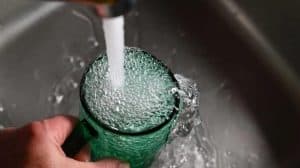
How To Choose Water Softener for Your Home and Needs
1. Determine Your Water Hardness
The foremost thing to determine is whether you have a hard water supply or not. Once you have established that you are receiving hard water, you need to check the hardness level. Depending on the hardness level, there are different water softener systems that you can pick.
A higher hardness level will need you to pick a resin tank with a higher GPG unit.
2. Select System Type
Whether you want to pick a system that can be easily attached to the water line or needs to be installed along the entire plumbing system is another critical consideration.
You can also have systems that can soften just the drinking water or the entire house water. Another consideration here would be based on the problem if you want to eliminate the limescale formation problem on the faucets and appliances or do you want to get the supply of soft water for drinking.
3. Determine the Appropriate System Size
System size depends on the size of the house, the number of people in the house, and the flow rate requirement. All these factors will play a vital role when picking the best system for your home. Keep these answers in mind while checking different systems. There are online calculators available that can determine the size requirement after you answer a few simple questions.
People Also Ask
What type of water softener is best?
There is no correct answer to this question. It depends on your budget and problem. If limescale is your only issue, then a cheap electrical descaler is enough to solve your problem. But if you need soft water for the entire house for every purpose, then the traditional ion-exchange filters are the best option to pick.
How much does a whole house water softener cost?
A descaler typically starts with $250 for the smallest size. After that, it can go up to $500. Water conditioners can start from $400, while salt-based ion-exchange filters can cost $1200 for the whole house set-up.
The cost depends on the size of additional parts needed during setup.
What are the pros and Cons of a water softener?
Pros:
- Softens hard water for drinking, and other daily activities
- Reduces the formation of scales in the pipes and additional water exposed appliances.
Cons:
- Long-term expense on maintenance of water softeners
Can I install a water softener myself?
Yes, there are many water softeners available in the market with a DIY instructions manual. These can be installed easily into the water plumbing system if you know plumbing basics.
Is a soft water system worth it?
Hard water is not easy to drink due to its weird taste. It also damages appliances and other accessories in the bathroom and kitchen. Due to the disadvantages of hard water, a soft water system is worth it in the long run.
Is it better to drink hard water or soft water?
Hard water has traces of magnesium and calcium dissolved in it. While some quantities of these minerals are required in a daily diet and are okay for consumption, large amounts of minerals aren’t recommended. Hence soft water is always recommended for drinking.
Is distilled water the same as soft water?
Distilled water is water formed after collecting water vapors by evaporating water. Hence distilled water does not have any impurities or minerals. It is the most purified form of water. On the other hand, soft water is just water that isn’t hard. Soft water may contain traces of minerals in a minute and acceptable quantities.
Final Word
Hard water has many issues that can be resolved using a simple water softener system. In this article, we have reviewed the top softener systems available in the market. We are sure it will help you pick the one that suits your need. The most common questions and concerns related to water softeners have been answered and addressed in this article, giving you enough knowledge about all the water softener systems available in the market.

